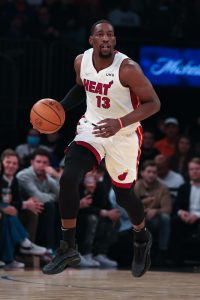Since Nets star Kevin Durant made his trade request earlier this week, NBA fans have become a whole lot familiar with a specific term in the league’s Collective Bargaining Agreement: the designated rookie extension.
As we explain in a glossary entry on the subject, a designated rookie extension is a five-year extension given to a player who is entering the final year of his rookie scale contract. It must be worth the maximum salary, but it’s that fifth year in particular that makes a player a “designated rookie.” A player who signs a four-year, maximum-salary rookie scale extension is not considered a designated rookie.
Here’s the full list of players currently on designated rookie extensions:
- Bam Adebayo (Heat)

- Devin Booker (Suns)
- Luka Doncic (Mavericks)
- Joel Embiid (Sixers)
- De’Aaron Fox (Kings)
- Shai Gilgeous-Alexander (Thunder)
- Donovan Mitchell (Jazz)
- Jamal Murray (Nuggets)
- Michael Porter Jr. (Nuggets)
- Ben Simmons (Nets)
- Jayson Tatum (Celtics)
- Karl-Anthony Towns (Timberwolves)
- Andrew Wiggins (Warriors)
- Trae Young (Hawks)
An NBA team is permitted to carry up to two players on designated rookie extensions, as the Nuggets are with Murray and Porter. However, a team cannot carry two designated rookies if both of those players were acquired via trade.
Because the Nets acquired Simmons from the Sixers in this year’s James Harden blockbuster, that means they’re not allowed to trade for a second player on a designated rookie extension unless they move Simmons beforehand (or in the same deal). The same rule would apply to the Warriors with Wiggins, but it’s obviously far more relevant these days for the Nets, who are said to be seeking at least one young star in a package for Durant.
Many of the players on the above list aren’t going anywhere — it’s not as if the Mavericks are going to consider trading Doncic. But with a player like Durant on the trade block, few NBA stars are untouchable, and teams will have to take the designated rookie rule into account when they consider offers for the former MVP.
For instance, the Suns and Heat, who have been mentioned as Durant’s preferred landing spots, wouldn’t be able to trade Booker or Adebayo for him (not that Phoenix would be willing to include Booker anyway).
Grizzlies guard Ja Morant, Cavaliers guard Darius Garland, and Pelicans forward Zion Williamson are expected to be added to the above list soon. Morant agreed to a five-year, maximum-salary extension with Memphis, Garland did the same with Cleveland, and Williamson will sign one with New Orleans.
The designated rookie rule says that a team can’t carry two players acquired via trade if those players have signed designated rookie extensions that apply to a “current or future” cap year, so even though the extensions for Morant, Garland, and Williamson won’t take effect until 2023/24, the rule would apply to them as soon as they officially sign.
Only a player who signs a rookie scale extension can become a designated rookie. The rule doesn’t apply to players who reach free agency, even if they sign a five-year, maximum-salary contract at that time.
Pelicans forward Brandon Ingram, for example, isn’t considered a designated rookie since he signed his five-year max contract after becoming a free agent. Deandre Ayton also can’t be a designated rookie now that he has reached free agency. Either player could hypothetically be sent to Brooklyn in a Durant trade.
Players who signed four-year, maximum-salary rookie scale extensions also aren’t considered designated rookies, as noted above. That means Raptors forward Pascal Siakam could also theoretically be traded to Brooklyn without Simmons having to move.
Again, teams can carry two designated rookies if just one was acquired via trade. For instance, the Heat wouldn’t be prohibited from making a deal for Mitchell, since their current designated rookie (Adebayo) has spent his entire career in Miami.
Finally, it’s worth clarifying that this rule only applies if a trade occurs after the player signed his designated rookie extension. In other words, the Thunder would be allowed to trade for a second designated rookie without moving Gilgeous-Alexander, since they acquired him from the Clippers before he signed his rookie scale extension.
What exactly would stop a Wiggins+picks for Durant trade?
Durant, likely.
Simmons contract, as indicated here, unless the Nets moved him, which they have no intention to do.
Thanks for the clarification!
Trade KD Simmons and Harris for Mitchell Conley Bojan Clarkson and a couple 1sts. Gets the Nets out of luxury tax he’ll in one season. They could trade all 3 except Mitchell at the deadline too.
2 Scenarios- If Wiggins signs an extension in the next few days, can the Warriors trade Klay Thompson for Simmons since Wiggins would no longer be on the rookie extended contract.
Second scenario could Raptors trade OG + Birch + Flynn+ Svi+ 1st for Simmons and would that cause the Raptors to be hard capped at $155 Million or in the alternative trade FVV + Birch+ Flynn+ Svi for Simmons and with certain finagling of non guaranteed contracts be under the luxury tax.
1. Wiggins would still be considered to be on his designated rookie contract until the new extension begins in 2023/24, so the Warriors would remain ineligible to acquire Simmons.
2. The Raptors wouldn’t be hard-capped in that scenario. The only way a team becomes hard-capped is by using its bi-annual exception, using more than the taxpayer portion of the mid-level exception, or acquiring a player via sign-and-trade. So no “normal” trade (ie. one that doesn’t involve a free agent being signed-and-traded) creates a hard cap.